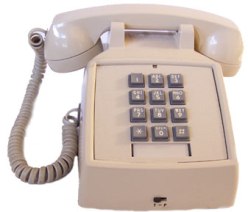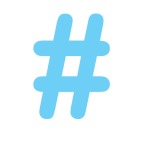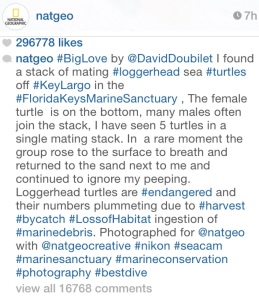Is there any #rhyme or #reason to these #socialmedia #symbols?
In the early 1960s, when I was a very little girl, a telephone man (remember them?) arrived at our house with a new gadget – a push-button telephone! Down went the rotary dialer and up on the telephone table went its replacement, a new, modern innovation replete with cool Touch-Tone sound effects.My brother and I hovered over the new household phenomenon and we asked aloud what the symbols meant that flanked the Operator, the * and the # buttons.
“Oh that is for something in the future,” the telephone man said, probably an outright guess on his part. Decades later the “pound sign” ushered in voice mail and automated customer service and everything about how we communicated on phones changed.
So too, on social media, where the pound or number sign is called a “hashtag.” In the many “Intros to social media” workshops I’ve conducted, the biggest audience question is about those hashtags! “It’s a way to isolate or track keywords,” I often explain, to which there is a lot of head scratching and seat shuffling. Late adopters to the Internet and social media don’t always make the connection and think these hashtag thingamabogs are rather silly. I have to back up and start slowly.Simply put, hashtags serve as a tool to sort content. I use the example of Delaware. On Twitter, if I search just “Delaware,” I get results for my state, plus Delaware, Ohio and maybe Delaware Indians. If I use “DE” I get my state, but also a lot of Spanish language articles. In our state, we have a catchall hashtag, #NetDE that anyone can use if it has something to do with Delaware. On Instagram, #Delagram is preferred, but #NetDE comes in second. I know this because I studied what others on social media are using over and over.
I have used it in a sentence to replace the state, “Congrats to our #NetDE #4H youth who won the #robotics championship! Way to Go!” Social media practitioners get it, but they don’t always get it right. There is considerable debate on how many hashtags to use, and what platform to use them on. Like many, I’ve tried and erred – not always happy with the tic-tac-toe interruptions across my brief, but carefully crafted prose. I continue to experiment with them, making hashtag mishaps along the way. But through observation I’ve picked up some good tips as well, and often times those little hashtags are helpers!
Example. On my Twitter feed, I noticed a lot of buzz about a weekend convention called Social Boom—one of many successful networking and training weekends devoted to social media and social media marketing. Many events like this have their own hashtag and this one was, (drum roll) #socialboom.
I didn’t attend, but I got the next best thing by following the many people who did and live tweeted all the good stuff. I followed #socialboom on Twitter by going to my search bar, typing it in and clicking “All Tweets” and every 30 seconds or so, someone would share a tidbit learned from the conference. The posts and or feeds drop down like a news service. It was like I was there. I could almost taste those tweets. From #socialboom I learned the following:
Never use hashtags on Pinterest. Not a good idea on Facebook or LinkedIn. Most definitely Yes on Twitter, Vine, Google+ and Instagram. If you see hashtags on Facebook, this is likely due to someone connecting their social media accounts to each other. Type once – populates everywhere. People do it, but among social media experts, it’s a big no-no. Hashtags on Facebook are not necessary, probably okay for a specific social media campaign, but as a rule no. Tagging yes, hashtags no.
And people can’t agree on hashtags either! I wish they would make up their minds! Throwback Thursday is a social media trend seen across most of the platforms. It’s when folks post vintage photos for the day. Lots of fun. Love it. But I have seen #tbt, #throwback and #throwbackthursday. For character spacing/saving, #tbt makes the most sense, but if you are searching, you have to know what is being used, and what all of them are! So I agree, it can get confusing!
Another example is #thewalkingdead vs #twd. Since #twd can mean many things (the weather doctor), and might be used for multiple reasons, the longer hashtag is the more standard/popular. It depends on context and timing. If you see #twd on Sunday nights from 9-10 p.m. it is a good chance it is the TV show and not a weather expert! You will commonly see a mixture of them for big events like the SuperBowl, The Golden Globes, etc. For notable events, I use and follow what the entity’s website has established as the official hashtag. They should know! But for big, national or international events, be prepared to see variation. Not everyone gets the memo!
On Instagram, I had already been experimenting. I usually kept my hashtags at @MDW302 to an acceptable level of three or four. #NetDE and #Delagram are the two most used to connect photos to my home state. Other than that, one might find #garden #Siamese and generic noun keywords that describe the main subject of any particular photo. I alternately use these within the sentence, sometimes tacking them on the end.
However, I observed that well-known photographers and those with large Instagram followers used a whole lot more than four. They used the hashtags like web meta tags, making every descriptive term into a hashtag, usually placed at the bottom. So, a simple picture of a sunflower, taken on a sunny day in August might be followed by: #sunflower #flower #garden #petals #yellow #august #summer #bluesky #fresh #sun #sunshine – and on and on.If you have a complex photo… well, you can just imagine! I don’t want to be a hashtag bombardier, but I tried the technique a few times on some pictures I thought were worthy of a larger audience. I added a half dozen or so hashtags. In almost all cases, I received new interactions (hearts/likes) outside of my small network of followers and many new followers to boot.
Lesson learned: experiment on Instagram. People are out there searching for other people who like taking pictures of the same thing. They find you because of the hashtag. You don’t use, you lose! There are people collecting and curating images by hashtag. #Siamese became #siamesecats, #cats #catsofinstagram #meezer.
If gaining followers is your thing on Instagram, try adding a few more hashtags. Try not to be obnoxious with it – don’t deliver a steady diet of hashtag horror! Everything in moderation!
Instagram now allows you to edit the text (and hashtags in photos). In a 4-H account I manage, there was this adorable picture of a team demonstration, and one young demonstrator was dressed as a cow (the demo was on milking). Originally I hashtagged for the State Fair, our state, and that was it. The picture received 10 or so likes. Last week, I went to that same picture and added #dairy #milking #cow #4h #cute and the picture instantly gained another 20 likes, almost overnight. Instagram is very hashtag driven!
The Mack Daddy of Hashtags is Twitter. Here are some Twitter hashtag tips:
1. Study first! Find out what your target audience and influencers are using. Agriculture often uses #ag but we also use #FarmDE or another state postal code. In social media, people use #social, #sm #socialmedia, with the latter being the most popular. A recent education service in Delaware was trying to get established on Twitter and were going nowhere fast. They weren’t using: #EduDE #KidsDE #NetDE in their posts, so the Delaware education leaders who used those hashtags remained in the loop, the new Twitter account’s tweets stayed outside the loop because they did not study commonly used terms for their area (location and topic).
2. Sticking to two or three hashtags is always a safe bet. Zero hashtags on Twitter is not good, especially if you are starting out on the platform.
3. Develop an internal hashtag for your business or organization. This is for curation. Example, a wine store may ask customers to use a hashtag and show what food they paired the wine with when they get home. Great idea! Customer tweets the picture using the hashtag, and the wine store can search this and retweet the image. This is earned customer engagement. At @Delaware4H we developed #DE4H. Why? Well, we want other accounts – youth, teens, parents, and volunteers talking about their 4-H experience. They can use #4H, but that is the national 4-H hashtag. They can tag us in a tweet or Instagram to get our attention also.
Example 1: “I am having a great time at @Delaware4h camp. Today I learned about soil health” That tweet TAGGED our account so we can use it and retweet it or curate it. Not bad. Tagging will get our attention, but it is longer than a hashtag. But it works. It allows us to know about other people who are talking about us. It is up to us if we want to share it. But to tag us means our audience has to know our handle, @Delaware4h. It might be easier to remember the hashtag we are trying to promote #DE4H.
Example 2: “I am having a great time at Delaware #4H camp. Today I learned about soil health #DE4H” This tweet would get the attention of national 4-H because it used that hashtag, and also by us, because we search for #DE4H so we can curate the content.
Example 3: “Having a great time at #DE4H camp. Today I learned about #soil health.” This Tweet would be seen by us as long as we are searching for that hashtag. Anyone else talking about “soil” would also see that post.
4. Check to see if the hashtag is already in use, and if so, for how long. Duplication happens, but you want to avoid any if possible. If you select a hashtag for your event, it does not mean you own it however. Inherent ownership comes from repeated and sustained use, but they aren’t copyrighted! Timing and context is a factor. Search the hashtag you are thinking of using and find out if others have used it, how frequently and how long ago. If the hashtag is current and popular, you might need to find another.
5. Check the appropriateness of the hashtag. In my UD social media class, our instructors showed an example used by British fans of the Dallas Cowboys. They used the hashtag #CowboysUK. The capital U was meant as a separator, but sound it out! (Cowboys Suck). Yikes! I don’t think that was their intention!
6. Lower and upper case matter – for aesthetics only. We have an annual event called Delaware Ag Week. The hashtag is #DEAgWeek the capital letters help separate the words, but if people use #deagweek it will work just the same.
7. Having an event? Create a hashtag for it. #SocialBoom is a great example. Another: in March, 2014, the National eXtension.org Conference met for a week and chose #NeXConf. When others use the event hashtag, they can be searched and retweeted by the event host. Hashtags also allow the host to curate social media content for that event. There are many aggregate curation platforms out there. I have used Storify, Tagboard and RebelMouse, but there are many others!
8. With a limit of 140 characters on Twitter, hashtags take up valuable space. The shorter the better, but visually they should make sense. Avoid symbols, dashes, underscores in your hashtag if you can. Numbers are fine, but bear in mind, it is an extra step for users of mobile devices.
9. If you don’t use hashtags, hardly anyone will find you. Again, be aware of your industry, your interests, your target audience and the people who are talking about what you talk about and want to join in the conversation. Study and emulate.
10. Avoid making up hashtags (okay some do it for theatrical affect) but if you are the only one who knows what the hashtag means, you are wasting valuable space. Nix the #iamhavingaterribleday type of hashtag.
11. Hashtag a keyword when it is valuable to the discussion. For instance, if I were a banker and I mention I took my kids to a farm on a family vacation, I might say, “Kids really enjoyed visiting the farm. Here is a picture of a #goat we saw” Goat is hashtagged because that is what the picture is about. If on the other hand, I am a farmer, blogging or advocating about agriculture, I might retweet that photo and say, “love this #goat pic a visitor took at our #FarmDE today. #ag ” Use hashtags on words that have meaning to your discussion. When I tweet about social media on Twitter, I always combine the two words and put the hashtag before. “I learned a lot taking my #UDel #socialmedia course.”
12. Use hashtags to look for and participate in organized talks. I follow #FoodChat, #GardenChat, #AgChat and #EdTechLN. These chats are held in a regularly scheduled time slot, are moderated with offered questions to which participants answer, and use the chat hashtag. They normally last one to two hours, depending on the popularity of the topic. There are organized hashtags on almost all topics.
To live in a harmonious hashtag world, study the best and imitate the rest. Moderation is always a good thing. Change it up occasionally and try new techniques. Oh… and #Have #Fun!




Hashtags are powerful communication tools. I liken them to a way to isolate the conversation such as a breakout room at a conference.
Lots of great info in your article. Thanks for taking time to write it.
LikeLike
That is a great analogy Stan!!
LikeLiked by 1 person
Pingback: I read the news today, oh boy | Socially Yours,
Pingback: Master Gardeners ask: What is the best social media platform to use? | Socially Yours,
Pingback: Extension pros: Are you on Twitter? | Socially Yours,